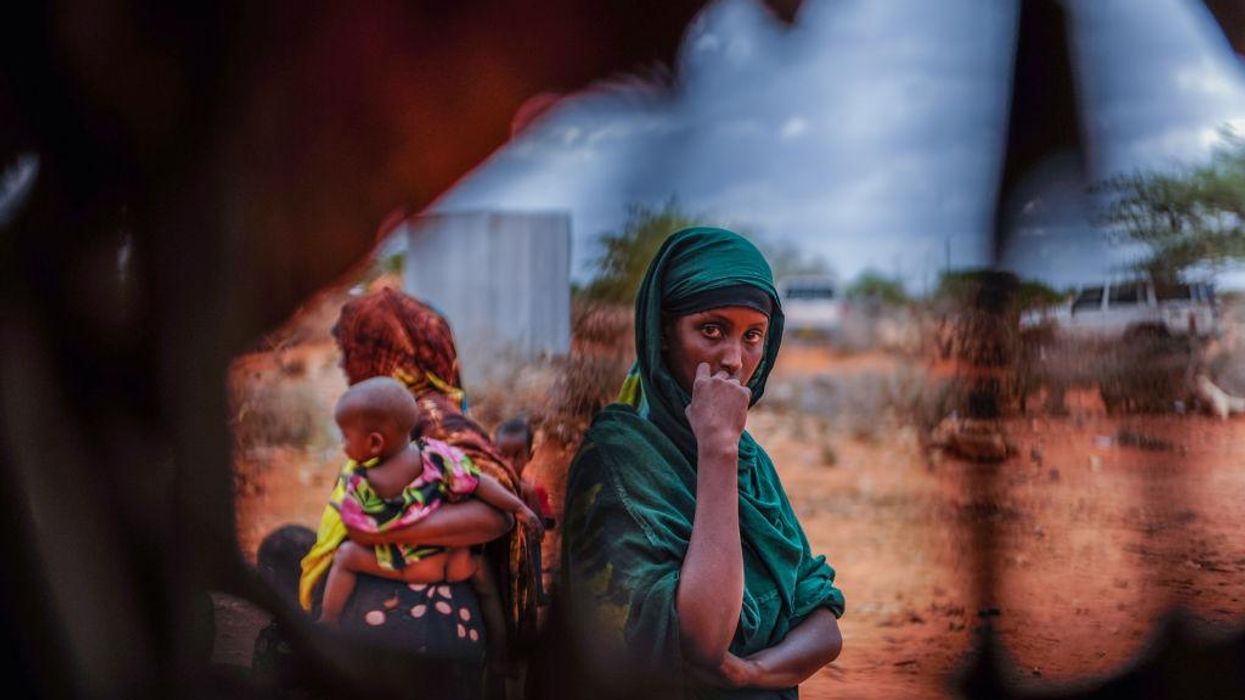
Photo by Gerald Anderson/Anadolu Agency via Getty Images

Climate change has been accused of being "inherently racist" and "sexist." It has been blamed for congenital heart defects. It now stands accused of another grievous category of misdeed.
According to an op-ed in the Washington Post, if a man in a poor country brutalizes a woman, his victim could attribute her aggressor's malice and cruelty at least in part to climate change.
The trio of authors advancing this notion — Geoffrey Ondieki, Disha Shetty, and Aie Balagtas See — tend to write about human rights, environmental, and women's issues.
In their article co-published Tuesday by the Post and the Fuller Project, their interests apparently converged, culminating in the suggestion that "the threat of violence could become more common as climate change makes extreme weather events more intense and frequent."
Terry McGovern, chair of the Population and Family Health department at Columbia University, told the Post, "Heat waves, floods, climate-induced disasters increase sexual harassment, mental and physical abuse, femicide, reduce economic and educational opportunity and increase the risk of trafficking due to forced migration."
McGovern conceded that the data remains limited on some fronts.
Nitya Rao, a gender professor at the University of East Anglia, suggested that the "climate discourse is all about the numbers, but the evidence on violence and changes in power dynamics cannot be captured that way, and so it is not given the same weight."
With an apparent dearth of proof to substantiate their claims, the article's authors seized upon an indirect link between bad weather and domestic violence taken up in the U.N.'s intergovernmental panel on climate change's recent report.
"Climate increases conflict risk by undermining food and water security," said the U.N. report, which may ultimately lead to an increase in "violence against women, girls and vulnerable groups."
This claim was coupled with a concession: "The influence of climate is small compared to socioeconomic, political and cultural factors."
Although not as influential as proven causes of violence, the report noted that there was "limited evidence, high agreement" that the fetching of water in poorer countries affected by droughts and other natural phenomena may be associated with domestic violence, specifically in hypothetical instances where women are found not to have completed "daily water-related domestic tasks."
While contending that increases in temperature may also be associated with heightened conflict risk "in certain settings," this claim was accompanied with a caution: "medium agreement, low evidence."
One 2020 study cited in the report indicated that there was "no significant correlation between annual homicide rate and annual temperature for New York City," for instance, and that no "linkages between temperature and crime have been reported for Canada."
The panel did, however, agree with "medium evidence," that "during and after extreme weather events, women, girls and LGBTQI people are at increased risk of domestic violence, harassment, sexual violence and trafficking."
The term "climate change" was noticeably absent from this claim, where instead "weather" was used.
Like gun control activists who diminish human agency and assign blame to inanimate objects for bad behavior, the authors appear keen to link bad behavior to bad weather rather than just bad people.
The Post article cites the story of a Kenyan woman named Pilot Lenaigwanai, who was driven from her home by an abusive husband.
Lenaigwanai's "husband was abusive even before the drought that's now ravaging Kenya's arid north."
It is unclear whether Lenaigwanai would still have fled to the Umoja refuge had the weather been better, but it is clear from the article that the drought was not what made her husband abusive.
Rommel Lopez, a spokesman for a local social welfare department in the Philippines, suggested that bad weather may be among the conditions that exacerbate preexisting frustrations.
"When there’s a calamity or disaster or conflict, that can put families in difficulties. The situation at evacuation centers is a contributing factor," said Lopez. "It makes them agitated. It adds to their frustration. When someone is frustrated, they could reach a certain point and that could trigger [violence]."
Shilpi Singh, who helps women in India's poorest state, suffered no illusions about what beside cruel men and the cultural norms that help captivate their victims is at issue: "It comes down to economic distress. ... The men vent out their frustration by beating the women, who are raised with the belief that leaving is not an option."